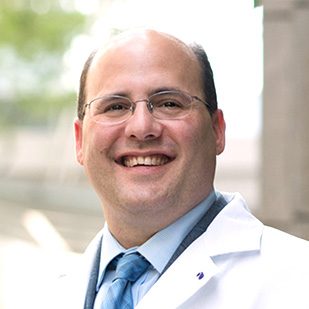Chief's Message

Since becoming Chief of Rheumatology in 2015, our division has seen tremendous growth in the number of faculty, expansion in areas of clinical expertise, and increased extramural support for ground-breaking research programs in clinical and basic science focused on providing new therapeutics or precision medicine approaches for our patients with rheumatic disease.”
Harris Perlman, PhD
Chief, Division of Rheumatology
Mabel Greene Myers Professor of Medicine
Over the past 5 years, we recruited, retained, and trained a diversified faculty who are experts in all spectrums of rheumatic disease including rheumatoid arthritis, psoriatic arthritis, ankylosing spondylitis, osteoarthritis, scleroderma, systemic lupus erythematosus, gout, myositis, and vasculitis. More recently,our scleroderma and vasculitis clinical programs have grown to become one of the largets in the U.S. Moreover, we are one of the few programs in the U.S. that has a dedicated ultrasound-imaging clinic, which maintains the state-of-the-art equipment as well as being the center for experimental procedures such as ultrasound-guided synovial biopsies.
Our faculty are the ideal mixture of the next generation of rheumatologists along with senior leaders in the field. While the junior investigators have been trained to be the new directors of the Clinical programs including scleroderma, systemic lupus erythematosus, vasculitis, functional genomics, and fellowship, our senior leaders have transitioned to be mentors for these faculty. Our faculty are world-renowned; they chair study national and international sections for grant reviews, are executive editors or editors in chief of leading rheumatic disease journals, and are board members of various rheumatic disease societies including Rheumatology Research Foundation and American College of Rheumatology and are recognized as ACR Masters by their peers.
The central focus of the research performed by our faculty is predicated on being transformative, translational, and collaborative. Our projects center on providing better treatments for our patients, identifying new therapeutics or the underlying basis of disease and establishing a precision medicine approach. Examples of our programs are studies in systemic sclerosis that identified an A20, a ubiquitin-editing enzyme in the development of fibrosis, work in systemic lupus erythematosus including a functional genomic approach to predict patients who will develop a flair with fatigue. Moreover, faculty are integral members of the U19 and PPG extramural awards in Pulmonary and Critical Care. Further, we are one of the few Divisions of Rheumatology to be funded by NIAMS, supporting our Clinical Research Program via a P30 award mechanism.
This past year, Dr. Anisha Dua became our fellowship director and succeeded Dr. Calvin Brown. Dr. Dua is a national leader who has expertise in training the next generation of rheumatologists. Instantly, she modernized our program to include individualized learning modules, timely reviews for fellows, a new wellness program, and a fellowship-driven didactic lecture series. Dr. Dua has also received additional support for our fellowship program through grants provided by Amgen, Horizon, and Pfizer. Our ACGME-accredited fellowship program is also one of the few across the country that is continually funded by an NIAMS T32 training grant. We are very fortunate to recruit outstanding fellows that are highly successful in obtaining extramural grant funding and staying in academic centers or industry. Moreover, due to the close proximity to the Ann and Robert H. Lurie Children's Hospital of Chicago, we established a new collaborative initiative to train adult and pediatric rheumatologists and physician scientists.
Over the past four years, we developed an infrastructure for precision medicine that is one of the best in the country. We created a clinical coordinator pool that assists all investigators with their IRBs, recruitment of patients, and REDCap implementation and design. Moreover, we established an RNA-sequencing core that is equipped with state-of-the-art robotics and sequencers as well as 10X chromium machines. Most importantly, we recruited an expert computational biologist, Dr. Deborah Winter, to lead our functional genomics program. To this end, our division has generated one of the largest biorepositories on tissue isolates from end organs of patients with systemic sclerosis and rheumatoid arthritis. Whole populations and single cells are being analyzed for their epigenetic, genetic, and proteomic profiles. Currently, we are expanding our biorepository to include vasculitis, myositis, psoriatic arthritis, and osteoarthritis. Our ultimate goal will be the development of a center for precision medicine that will help dictate a specific course for personalized treatment of each patient.
I look forward to this challenge and expect great accomplishments from our faculty.